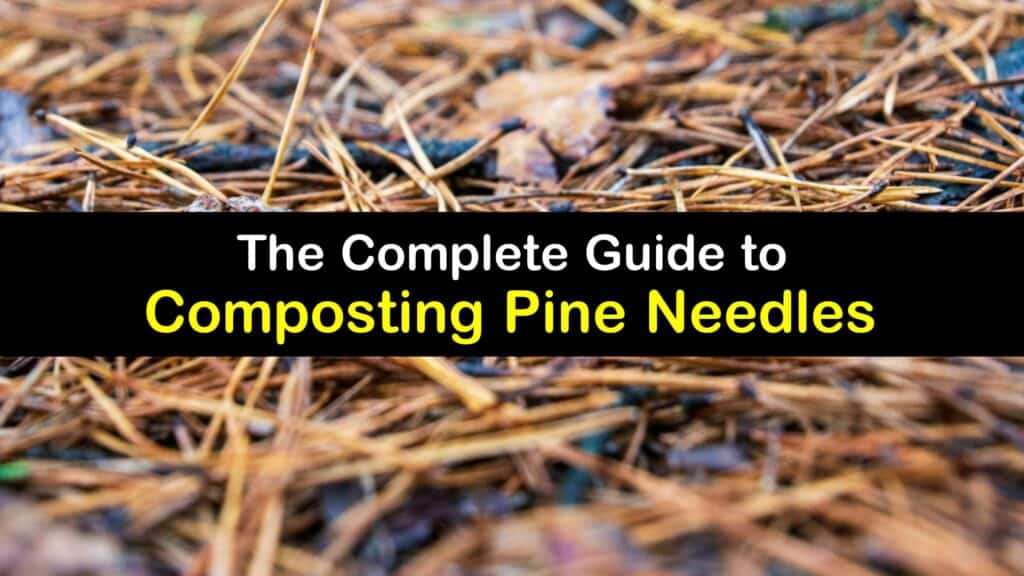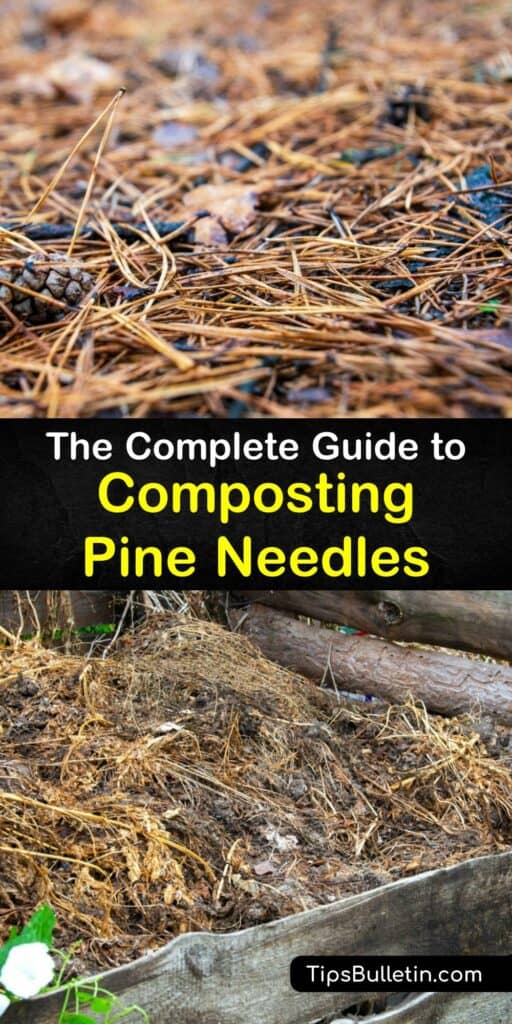The pine tree is a festive symbol, yet figuring out how to dispose of fallen pine needles when the season ends is puzzling. If you have pine trees in the yard, you likely run into fresh pine needles and pine cones on the ground. If you’re preparing to dispose of your Christmas tree remnants, you may wonder, “Can you compost pine needles?”
Pine needles clog your lawn mower and make your yard look unkempt. Composting pine needles is a clever way to upcycle this organic waste into finished compost for your flower bed. Get rid of the leaf litter from your lawn or the residue from your decorative tree by learning how to compost pine needles fast.
A compost pile relies on Mother Nature to harness natural processes to break down organic material into plant food. Pine needle mulch and compost are environmentally friendly and valuable methods of disposing of pine needles – both yield a helpful product.

Everything About Composting Pine Needles
Can you compost pine needles? Like most organic matter, you can add pine needles and lawn clippings in the compost bin. Some people have reservations about composting pine needles for fear of affecting soil pH. Fresh pine needles have a lower pH, suited for acid-loving plants.
As they dry out and during composting, pine needles become neutral. These wax-coated, thin green leaves carry vital compounds such as carbon and phosphorus and help keep your compost pile dry and aerated. Pine needles and orange peels make great compost. Learning how to compost them fast gives you a great option for clearing leaf litter or disposing of needles from your holiday tree.

Can You Compost Pine Needles?
Around Christmas time, many people wonder, can pine needles be composted? There is some debate about composting pine needles due to their acidity. Most growers aim for finished compost to be neutral in pH and suitable for use on many plants.
Fresh pine needles are slightly acidic, with a pH of around 3.8, and dry pine needles are neutral. When fresh or dried needles have undergone the decaying process in your compost pile, they are pH neutral in the finished compost.
Pine needles are nutrient-dense and higher in carbon than nitrogen, making them part of the brown ratio. They degrade to give compost structure and increase the available nutrients, making them perfect for composting.
Can You Put Pine Needles in Compost Bins and Piles?
Evergreen plants continuously lose their needle-shaped leaves throughout the year. Unlike oak leaves, they have a waxy coating, and resinous needles help protect them from freezing during the winter. A compost bin or pile is an excellent technique for crafting pine needle compost.
The items you place in your compost bin must decay to create nutrient-rich compost. Most people prefer this to occur quite rapidly. With extra care, it’s possible to turn your fresh needles into compost quickly using a compost bin or pile.
How to Compost Pine Needles Fast
Never include more than 10% pine needles into your composter at a given moment. Since pine needles are waxy and slow to decay, maintaining good moisture, aeration, and nitrogen-carbon balance are key. A well-kept, well-functioning pile processes pine needles much faster than a poorly maintained one.
Add green materials such as yard and kitchen waste for the compost bin at the same time you add the pine needles. Cut them into small pieces or use a wood chipper if you include branches. Smaller chunks break down faster.
Be aware of the source of your pine needles. Avoid putting pine sprayed with chemical insecticides or mixed with non-biodegradable litter on your compost pile. Harsh chemicals and plastics can slow or stop the decomposition and halt the production of finished compost.
The Benefits of Pine Needle Compost
Are pine needles good for compost? Pine needles are a worthwhile ingredient for composting, and the resulting pine needle compost has much to offer your plants. Pine needle compost adds nutrients like nitrogen and carbon when spread on the soil. Plants utilize these nutrients for photosynthesis and growth.
The compost also aids in retaining water for crop use. Pine needle compost provides beneficial microbes to plants. Microorganisms are essential because they oxygenate the soil and protect plants from illness.
Save yourself a trip to the dump and some trash bags by composting your fallen leaves rather than trying to dispose of them. A common misconception is that organic waste will decompose in a landfill. This notion is accurate, although it takes a lot longer, and the nutrients created from the decay are wasted.
It costs nothing to compost and is far better for the environment. Making pine needles into compost saves you money on store-bought fertilizer and ensures your plants flourish.
Use Pine Needles as Organic Mulch
Everyone from the beginner to the master gardener has heard of mulch. This surface covering helps the soil retain moisture and prevents weed growth. There are various types of mulch.
Pine mulch or pine straw mulch is a popular organic mulch and another use for your pine needles if your composter is full. Pack a thick layer of needles over the soil around the base of plants.
Though composting negates the low pH of fresh pine needles, it’s best to use fresh pine mulch only for acid loving plants. Tomato plants, azaleas, and blueberry bushes enjoy acidic soil and benefit from mulching with pine needles.
Composting pine needles is a convenient way to get rid of the leaves from your yard. As the popularity of organic gardening grows, more people are eager to use compost as one of the best natural fertilizers. Compost pine needles and reap the advantages of free organic fertilizer for larger plants and more abundant harvests.

If you loved this enlightening article discussing can you compost pine needles, please share this knowledge with your friends and family who are eager to learn how to compost pine needles fast on Pinterest and Facebook.